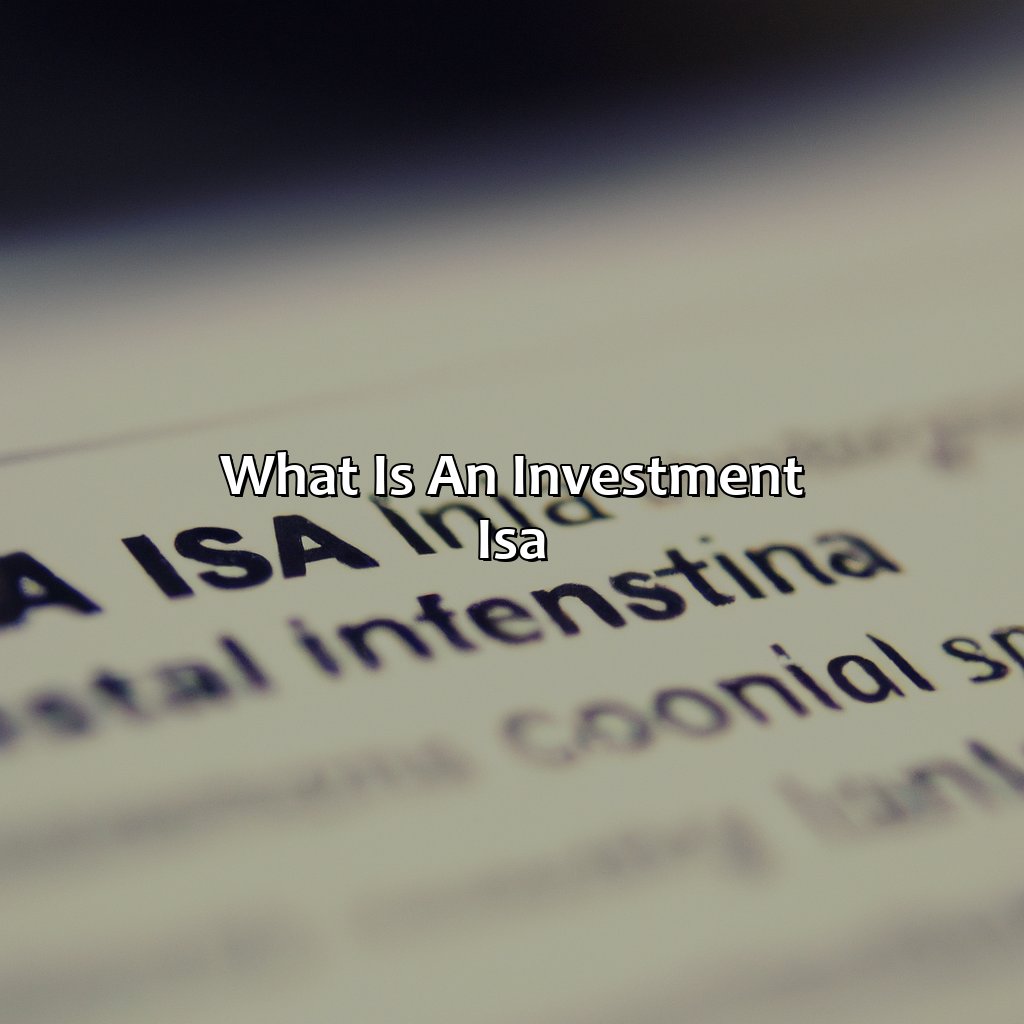What Is An Investment Isa?
Key Takeaways:
- Investment ISAs are a tax-efficient way to invest in the UK: An Investment ISA is a savings account that allows individuals to invest money in various assets without paying income and capital gains taxes on the returns.
- There are various types of Investment ISAs to choose from: Cash ISA, Stocks and Shares ISA, and Innovative Finance ISA. Each type of ISA has its own pros and cons, and investors should choose the option that best suits their investment goals and risk tolerance.
- Investors should carefully consider their investment strategy when investing in an ISA: It is important to balance risk and return and diversify the investment portfolio to minimize risk. It is also crucial to choose a reliable and trusted provider and regularly monitor the performance of the investment.
Are you looking to make your savings work harder for you? An Investment ISA could be the answer. With tax-free investment opportunities, this is a great way to ensure your hard-earned cash works harder for you. You could enjoy potentially higher returns than with a savings account.
Understanding Investment ISA
Do you want to understand Investment ISA? Well, we’ll tell you all about it! Here’s the definition and explanation, plus the benefits and advantages. Ready to dive in? Let’s go over the sub-sections:
- Definition
- Explanation
- Benefits and Advantages
Time to make those informed decisions about long-term investments!
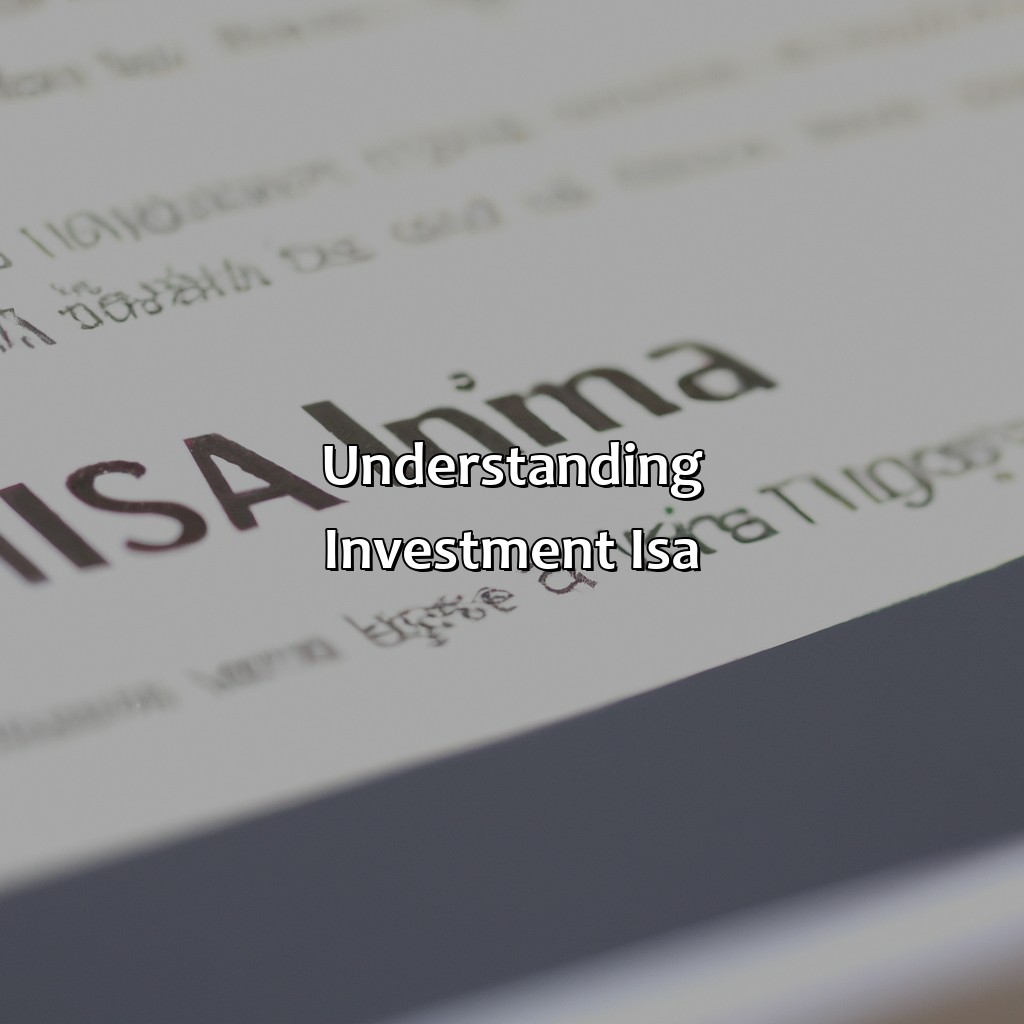
Image credits: retiregenz.com by Joel Duncun
Definition and Explanation
Investment ISA, also known as a Stocks and Shares ISA, is a type of tax-efficient savings account in the UK. Rather than just holding cash, it allows you to invest in a range of investments such as stocks, shares, bonds, and funds. This means that potential returns can be higher but comes with investment risk.
In an Investment ISA, the government doesn’t tax any money earned from your investments which can help your money to grow faster. The amount you can invest each year is limited and it changes yearly. It’s important to note that investing always comes with risks such as fluctuations in the stock market so it’s essential to consider if this savings approach is right for your goals.
If you’re looking to save for the long term and are comfortable with investment risks, then opening an Investment ISA might be perfect for you. By taking advantage of opportunities offered by an investment ISA enables your money growth more quickly without paying extra taxes making this type of account ideal for many savers who want to maximize their tax efficiency. Don’t miss out on this opportunity; start planning and investing today.
If you want your money to grow faster than a garden gnome on steroids, an Investment ISA is your best friend.
Benefits and Advantages
Investment ISAs offer many advantages for investors, making them a popular choice for those who wish to grow their wealth. Here are some key benefits and advantages of investment ISAs:
- Tax-free growth: Investment ISAs provide tax-free growth on investments, which means that all returns made from your investment are yours to keep.
- Diverse investment options: Investors can choose from a range of diversified investment options, including stocks and shares, bonds, and cash.
- No capital gains tax: Investment ISAs do not attract capital gains tax or any other taxes on profits earned through the investment.
- Flexibility: Investors have the flexibility to choose how much they want to invest each year and when they want to withdraw their money. This makes them ideal for both short-term and long-term savings goals.
It is also important to note that some ISA providers may offer additional benefits such as discounts on fund management fees or reduced account charges.
Investment ISAs are a great way to save money while growing your wealth at the same time. By taking advantage of such opportunities, investors can enjoy significant financial gains in the long run.
From Stocks and Shares to Lifetime ISAs, there’s an Investment ISA option for every risk appetite… or lack thereof.
Types of Investment ISA
Know the types of Investment ISA. These include:
- Cash ISA
- Stocks and Shares ISA
- Innovative Finance ISA
Each presents a unique solution. Explore the differences in this section of the article. This will help you understand which ISA type is best for you. Consider your investment goals and risk tolerance.
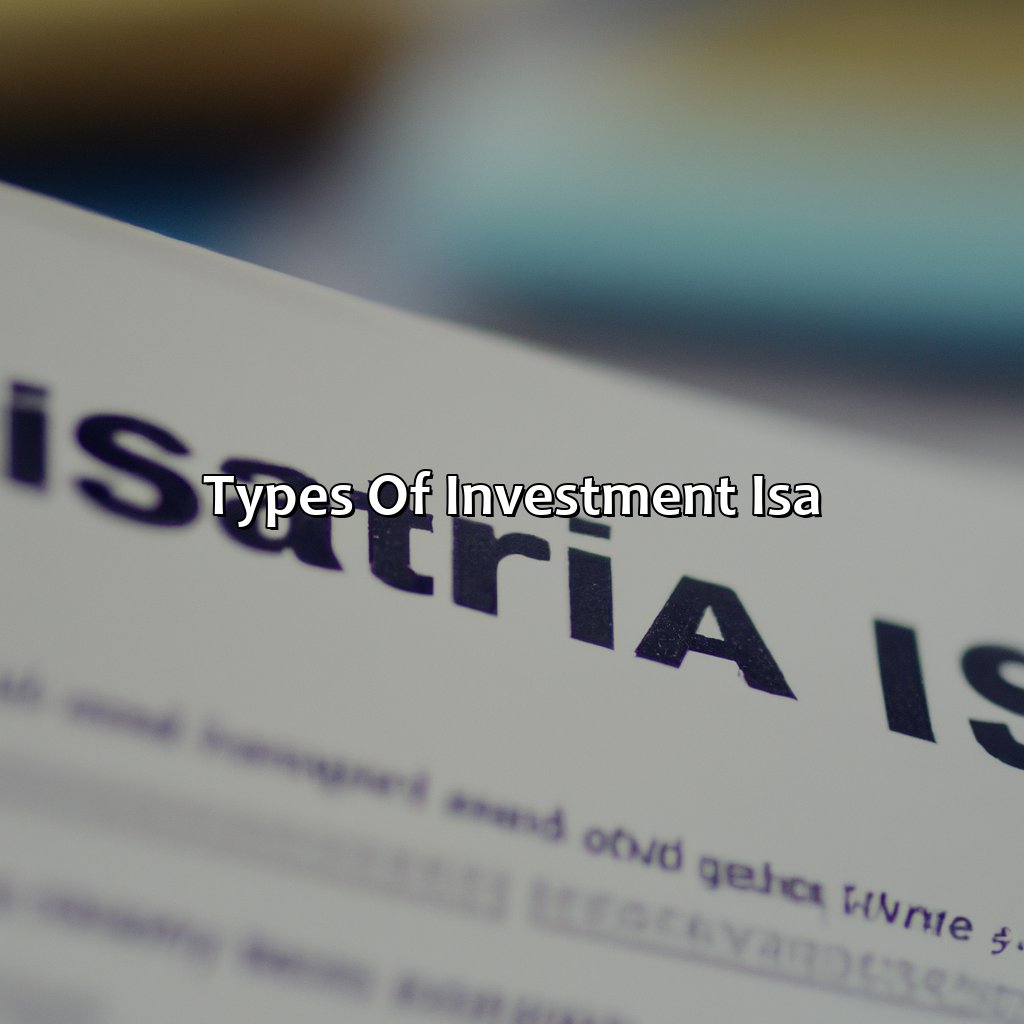
Image credits: retiregenz.com by Yuval Duncun
Cash ISA
An investment vehicle that enables individuals to deposit money into a tax-free savings account is known as a Cash ISA. It operates in the form of a savings account, but it has the added feature of tax efficiency which allows you to earn interest without paying tax on your gains. Banks and building societies offer different types of Cash ISAs, including an instant access account or a fixed-term account. The interest rates offered by these accounts are subject to market conditions and can change over time.
It’s beneficial to keep an eye on cash ISA deals because interest rates often vary by bank or building society. Moreover, some providers may offer bonuses for opening accounts, which might boost returns temporarily. While the advantage of storing your money in a Cash ISA over other similar savings accounts is important, the incentive provided by considering fixed-term vs instant-access ISAs should not be overlooked.
Pro Tip: Opt for an easy access Cash ISA if you require immediate access to your funds since this type of investment doesn’t have any withdrawal penalties if funds are withdrawn before maturity date.
Investing in stocks and shares ISA may be like jumping into a shark tank, but at least the sharks have a decent chance of making you money.
Stocks and Shares ISA
Investment ISAs that invest in the stock markets are known as Equity ISAs, which means investors buy shares in companies listed on the UK and foreign stock exchanges. This type of ISA is also commonly referred to as a ‘Share-based ISA‘ or a ‘Share Dealing ISA‘.
Investors can select stocks from stock exchanges or choose investment funds that include a wide range of individual stocks. An equity ISA allows investors to hold shares in individual companies and usually focuses on long-term investments with potential for capital growth. Sometimes there may be low interest rates, but there is a chance to earn returns from rising share prices.
Equity ISAs can present risks if an individual company’s share price drops sharply but investing in various funds reduces these risks. The performance of Equity ISAs depend on market trends because of the unpredictability of financial instruments.
For better results, people should research before selecting stocks or funds based on their risk appetite, goals and other factors. Because Equity ISAs give a lot more freedom than Cash or Lifetime ISAs, expert advice is highly recommended for those who lack experience in investing.
Investing in peer-to-peer lending through an innovative finance ISA may be risky, but at least you can pretend you’re a shark on Shark Tank.
Innovative Finance ISA
In the world of investing, there exists a form of Individual Savings Account (ISA) known as the Pioneering Finance ISA. This variation allows investors to lend their capital directly to borrowers without the need for an intermediary such as a bank. The risks associated with this approach are higher than those of traditional ISAs since borrowers could default on their loans, but returns can be more substantial.
Investors who opt for Innovative Finance ISA stand to reap benefits such as tax-free returns on their investments made through peer-to-peer platforms. However, it would be wise to remember that like any other investment, lending to consumers towards specific ends carries an associated level of risk that is not covered by any form of State guarantee or equivalent.
This type of fund provides SMEs access to quick yet cheap funding hence promoting growth at lower interest rates than they might have obtained through syndicated lending or bank loans. In contrast, suitable individuals and companies who require access to a loan find that their loan applications appeal more prominently on P2P platforms than within conventional channels, making access readily available.
Remarkably, several success stories have rolled out following investments into the Innovative Finance ISA account. A London-based company recently secured over £1million via a P2P platform before being listed in currency exchanges nationwide—a typical use case scenario where this type of funding proves useful in actualising entrepreneurial aspirations at an even larger scale.
Opening an Investment ISA is easy, just bring your wallet and a willingness to lose money.
How to Open an Investment ISA
Choose wisely! To open an investment ISA, you must meet eligibility and requirements. Get insights on how to pick the right provider. Check out their eligibility and requirements to make the best choice.
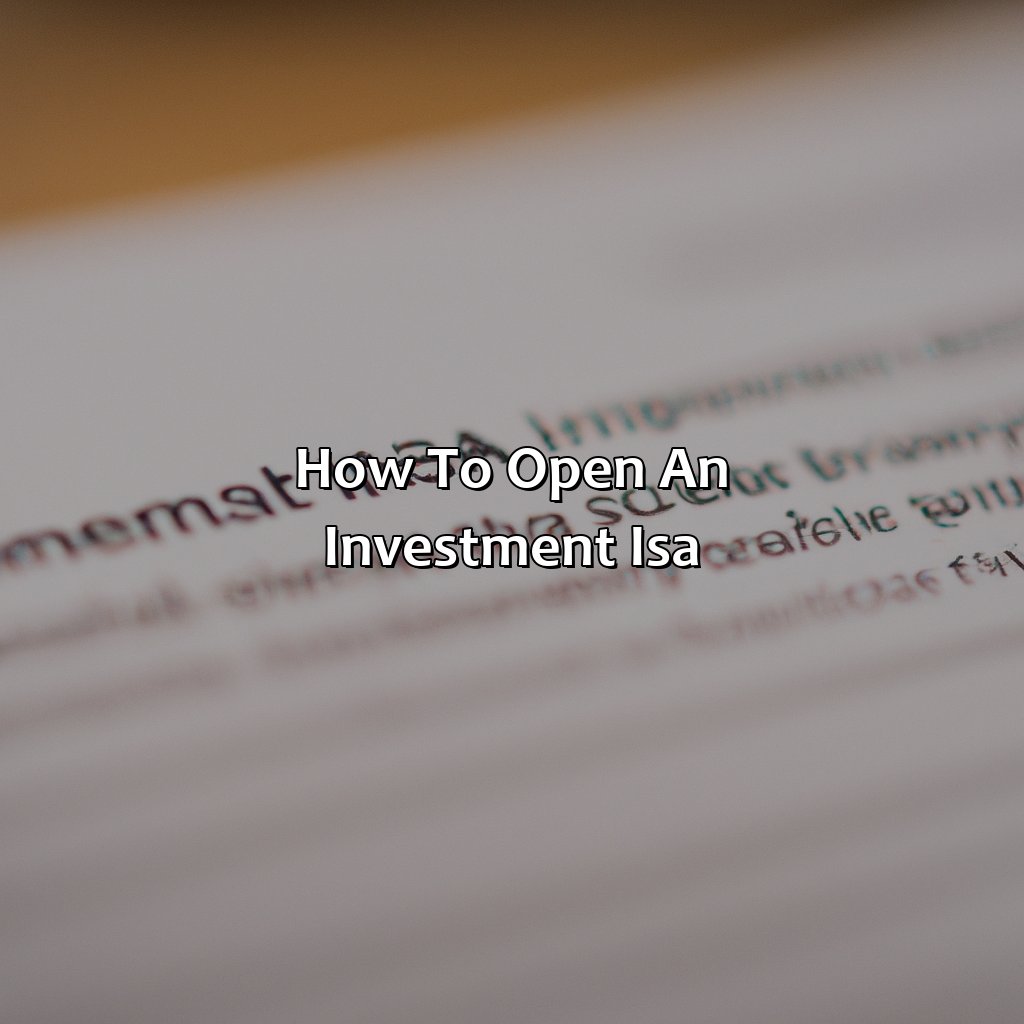
Image credits: retiregenz.com by David Jones
Eligibility and Requirements
Investment ISAs have certain prerequisites for eligibility. 1. individuals must be 18 years or older and a UK resident for tax purposes. Furthermore, potential investors cannot have subscribed to an ISA of the same type in the same financial year. To open an Investment ISA, providing the minimum investment amount is mandatory, which varies according to the provider. In addition to these requirements, investors should consider their individualized investment approach and evaluate their risk tolerance before venturing into Investment ISAs.
It’s important to note that not all providers offer the same Investment ISA options or rates of interest. Reviewing several providers may ensure that investors select one that best aligns with their investment goals.
According to The Financial Times, as of September 2021, more than £6bn ($8bn) had poured into UK funds since the start of the year through ISAs alone.
Choosing the right investment provider is like choosing a spouse – you want someone reliable, trustworthy, and willing to take risks with you.
Choosing a Provider
To find the ideal investment ISA provider, consider these following five points:
- Compare fees and charges from various providers.
- Check what types of investments are available to you; this could include funds, bonds, stocks, or shares.
- Ensure the provider has a good reputation and is backed by reputable investors.
- Assess their customer service quality and the tools that they provide for managing your finances.
- Determine which provider matches your investment goals and preferences.
It’s also wise to read online reviews from other customers who have invested in ISAs before and compare different providers until deciding on one that fits well with your needs.
To avoid any unexpected surprises down the line when it comes to choosing an investment ISA provider, ensure that you always read all terms and conditions carefully.
Some suggestions for selecting an Investment ISA provider should involve researching their charges versus the value they offer and checking if there are any extra costs to get started. Additionally, reviewing their terms thoroughly can help investors avoid future inconveniences associated with hidden fees or misleading advertisement end results.
An investment strategy without a plan is like a unicyclist without balance – doomed to crash and burn.
Investment Strategy for ISA
To make the most of your ISA, evaluate your financial aims and risk-taking attitude. Balance risk and return – that’s key for growth and security. Also, spread out your investments for a safer portfolio. Don’t put all your eggs in one basket!
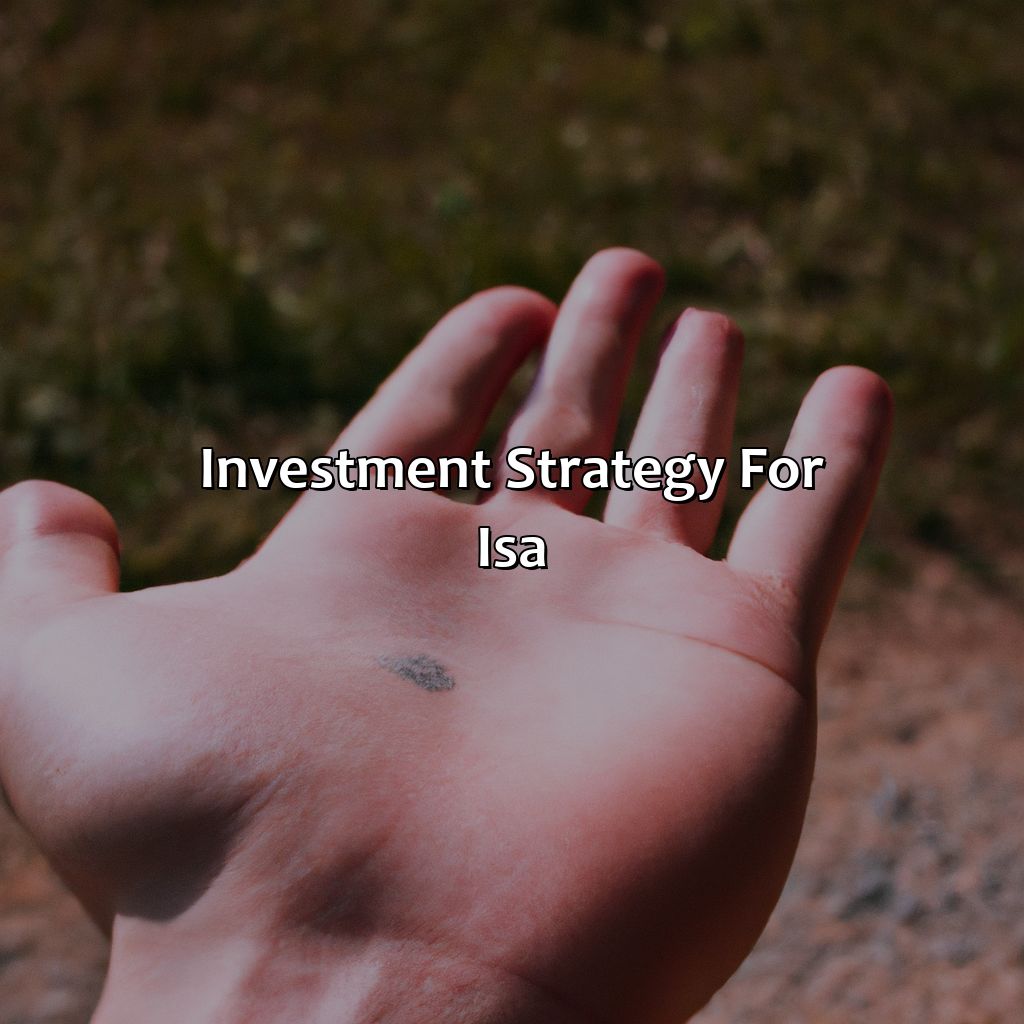
Image credits: retiregenz.com by David Jones
Risk vs. Return
Investing in an ISA requires consideration of risk and return. Your investment ISA’s success depends on how much financial risk you are willing to take to gain returns. While high-risk investments have the potential for higher returns, they may also lead to financial loss within the invested capital. Low-risk investments have a lower rate of return, but ensures a safer investment with less probability of financial loss.
Furthermore, it is essential to balance your portfolio by choosing a diverse mix of high and low-risk assets that aligns with your investment goals while considering market conditions.
Investment in funds offers exposure across diversified sectors including equities, bonds or commodities, managed by professionals, ensuring good performance optimally matching current market forces.
Experts suggest being cautious about scams when investing online; Money Supermarket recommends checking FCA registration and credentials via their website before investing.
A recent report by Morningstar revealed growth mutual funds improved by 20%, which is a reliable investment option for cautious investors looking for steady returns over the long-term.
Diversification is like having multiple crushes, it may be confusing at first but it’s always better to spread your options.
Diversification
Investing in a variety of securities is crucial for risk reduction and increasing the potential returns on an Investment ISA. A diversified portfolio helps to spread risk, enabling investors to cope with the ups and downs of markets. Allocations to different asset classes, sectors or geographies are useful when they do not move in tandem during market fluctuations. By maintaining a suitable balance between diversified assets such as stocks, bonds, mutual funds, commodities or peer-to-peer lending platforms in an ISA, investors can achieve a better financial outcome.
To ensure effective diversification, it is important to evaluate individual investor needs before selecting investments for the portfolio. Factors like age, investment horizon and risk tolerance influence decisions on asset allocation strategies. As well as thorough research on the securities being considered for inclusion in an ISA’s portfolio. It is also vital to review portfolios regularly to ensure that they remain optimally balanced.
A diversified ISA need not be complicated, and it does not have to involve excessive activity; rather than spreading your investments too thin across many options; consider focusing on high-quality companies within particular sectors or geographical regions.
Pro Tip: A professional financial advisor can help you navigate different investment options and create a customized diversification strategy that will suit your objectives even more effectively.
Some Facts About Investment ISA:
- ✅ An Investment ISA is a type of Individual Savings Account that allows you to invest your money in stocks, shares, and funds. (Source: Fidelity)
- ✅ Investment ISAs have an annual limit of £20,000. (Source: Money Advice Service)
- ✅ Investment ISAs offer tax-free returns on your investment. (Source: Hargreaves Lansdown)
- ✅ Investment ISAs have the potential for higher returns than traditional savings accounts but also come with higher risks. (Source: MoneySuperMarket)
- ✅ Investment ISAs offer a range of investment options, including stocks and shares, bonds, and property funds. (Source: Barclays)
FAQs about What Is An Investment Isa?
What is an investment ISA?
An investment ISA (Individual Savings Account) is a tax-efficient savings account offered in the UK that allows individuals to invest in a variety of asset classes, like stocks, bonds, funds and cash. The returns on these investments grow tax-free as long as they stay within the ISA wrapper.
Who can open an investment ISA?
Anyone who is at least 18 years old and a UK resident can open an investment ISA. However, there is also a Junior ISA available for children under 18 with the permission of their parent or guardian.
What are the benefits of an investment ISA?
The benefits of an investment ISA include tax-free growth on your investments, the ability to switch between investments, and easy access to your money when you need it. This means it’s a great way to save for the long-term, particularly for retirement or other future financial goals.
How much can I contribute to an investment ISA?
The maximum amount you can contribute to an investment ISA in the tax year 2021/22 is £20,000. This limit is reviewed annually by the government, so it’s worth keeping an eye on in case it changes.
What are the risks of investing in an investment ISA?
The risks associated with investing in an investment ISA are the same as with any other investment. This means there is a risk that you can lose money, as the value of your investments can go down as well as up. It’s important to do your research, diversify your investments and be prepared to hold your investments for the long-term to reduce the risk of losing money.
What should I consider when choosing an investment ISA?
When choosing an investment ISA, you should consider factors such as the investment strategy and asset mix, fees and charges, the provider’s track record and customer service, and the level of risk you are comfortable taking. It’s also worth seeking independent financial advice to help you make the right decision for your personal circumstances.
